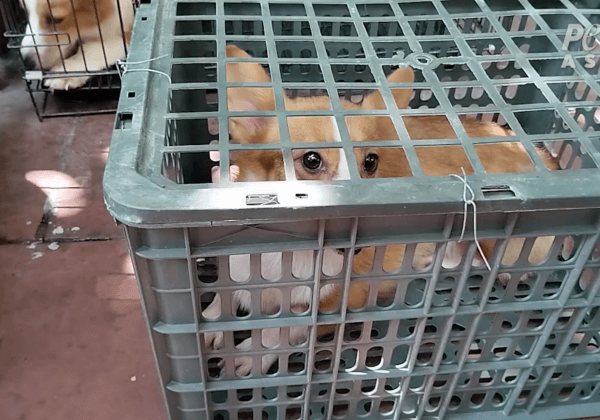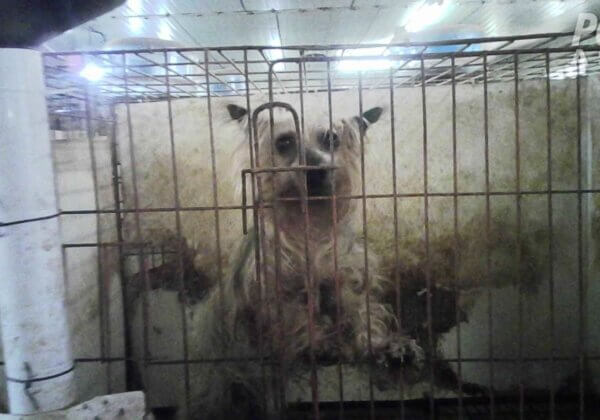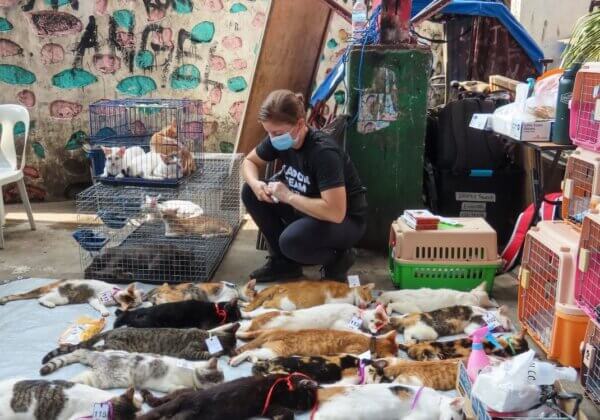Cruel Practices
While some lucky animal companions are treated as members of the family (as well they should be!), many others are neglected and even abused.
Chaining is a cruel punishment for dogs, who need companionship, exercise, and affection. Kept “out of sight, out of mind,” chained dogs are forced to eat, sleep, and relieve themselves in the same place day after day, often for years—which can cause them severe psychological harm. They’re often deprived of adequate food, water, veterinary care, and shelter from weather extremes in addition to having their emotional and social needs completely ignored. Chained dogs are also more likely to attack because the constant confinement and neglect cause them to become neurotic and aggressive—their severely restricted living space makes them more territorial, and they don’t have the option of escaping during a confrontation.
Leaving dogs inside hot cars can be deadly, even if it’s “just for a minute.” On a 32-degree day, the temperature inside a parked car can reach over 50 degrees after only five minutes. In just a short amount of time, animals can sustain brain damage or even die of heatstroke. Beating the heat is especially difficult for dogs because they can only cool themselves by panting and sweating minimally through their paw pads. If you see a dog left alone in a hot car, take down the car’s color, make, model, and license plate number. Have the owner paged in the nearest buildings or call local humane authorities or the police. Don’t leave the scene until the situation has been resolved. If the dog’s life appears to be in imminent danger, find a witness who will vouch for you and remove the dog from the vehicle by any means necessary. Lower the dog’s body temperature by providing cool (not cold) water.
Declawing, a cruel practice performed purely for the convenience of humans, is a painful mutilation that involves 10 individual amputations of not just the nails but also the ends of the toes (bone and all). Long-term side effects of declawing can include nails that grow back inside the paw—a very painful yet invisible condition—and a gradual weakening of the leg, shoulder, and back muscles. Declawing is so harmful to cats that it has been outlawed or severely restricted in nearly two dozen countries, including Japan, England, and Australia.
Birds don’t belong in cages. All caged birds were either captured or are captive-bred. In the wild, these beautiful beings are never alone, and if they are separated from their flockmates for even a moment, they call out frantically for them. Confined to barren cages, denied the opportunity to fly, and deprived of the companionship they need, many birds become neurotic, pulling out their own feathers and mutilating themselves—sometimes even to the point of death.
Fish in tanks also suffer. Fish are meant to live in ponds, lakes, rivers, and oceans—even the biggest, most well-maintained aquariums can’t compare. Approximately 95 percent of saltwater fish sold in pet shops are abducted from the wild, mostly from the waters around the Philippines, Indonesia, Fiji, and other islands in the Pacific Ocean. Divers use cyanide to stun them for easy capture and then transport them all over the world in plastic bags or bowls, neither of which provide them with adequate space or oxygen, to be sold into a meaningless, impoverished life of captivity.
Animal hoarders were formerly regarded as well-intentioned people who were simply overwhelmed by the animal-overpopulation crisis. But new information has shown that the root problem runs deeper than simply having too big a heart. The consequences of animal hoarding on the hoarders themselves, their human dependents, the animals they collect, and the community are extremely serious. Hoarders amass large numbers of animals, keep them in extremely crowded and filthy conditions, and fail to meet their basic needs for food, water, veterinary care, and hygiene. As a result, many languish and die. Without intervention, hoarders have a nearly 100 percent rate of recidivism. Please always report known or suspected animal hoarders to authorities immediately.
All companion animals deserve a life free of pain and suffering. If you see or hear of any companion animals who are being mistreated or neglected, try to intervene by contacting humane authorities or PETA for help.










